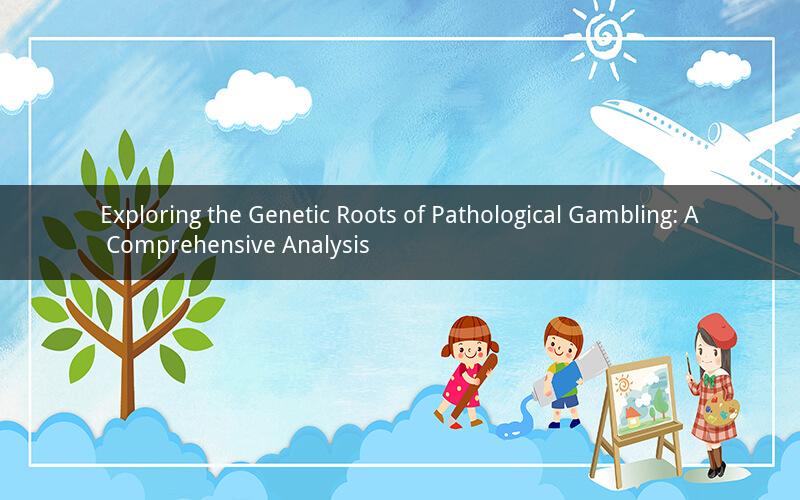
Pathological gambling, often referred to as gambling addiction, has long been a subject of great concern in the field of psychology and addiction studies. The question of whether pathological gambling is genetic has sparked intense debates among researchers. This article delves into the genetic aspects of pathological gambling, presenting a comprehensive analysis of the latest findings and theories.
The Genetic Basis of Pathological Gambling
1. Twin and Family Studies
Twin and family studies have provided significant evidence for the genetic component of pathological gambling. Researchers have found that individuals with a family history of gambling addiction are more likely to develop the condition themselves. In addition, studies comparing identical and fraternal twins have revealed a higher concordance rate for pathological gambling in identical twins, suggesting a genetic influence.
2. Genetic Markers and Associations
Several genetic markers have been identified as associated with pathological gambling. One such marker is the dopamine D4 receptor gene, which has been found to be associated with impulsivity and addiction. Other genes, such as those involved in serotonin and glutamate neurotransmission, have also been implicated in the development of gambling addiction.
3. Gene-Environment Interaction
It is important to note that genetics alone do not determine whether an individual will develop pathological gambling. Gene-environment interaction plays a crucial role in the onset of the disorder. Factors such as stress, trauma, and social influences can trigger the development of gambling addiction in genetically predisposed individuals.
The Role of Dopamine in Pathological Gambling
1. Dopamine and Reward Pathway
The dopamine system plays a critical role in the reward pathway of the brain. In individuals with pathological gambling, the reward pathway may be hyperactive, leading to a heightened sense of pleasure and reward from gambling activities. This may explain why individuals with gambling addiction find it difficult to stop engaging in gambling behaviors.
2. Dopamine D4 Receptor Gene
As mentioned earlier, the dopamine D4 receptor gene has been associated with impulsivity and addiction. Mutations in this gene may result in reduced dopamine activity, leading to a higher risk of developing pathological gambling. However, it is essential to consider the interaction between this gene and environmental factors.
The Impact of Pathological Gambling on Individuals and Society
1. Psychological Consequences
Pathological gambling can have severe psychological consequences, including depression, anxiety, and substance abuse. Individuals with gambling addiction may experience significant distress and impairment in their personal, social, and professional lives.
2. Social and Economic Consequences
The societal impact of pathological gambling is substantial. Individuals with gambling addiction may incur significant financial losses, leading to financial problems, bankruptcy, and even homelessness. Moreover, the family members of individuals with gambling addiction may also suffer emotional and financial distress.
5 Questions and Answers
1. Q: Is it possible to prevent pathological gambling through genetic screening?
A: While genetic screening can identify individuals at higher risk for pathological gambling, it is not currently possible to prevent the disorder entirely through genetic interventions. Early detection and intervention are crucial in preventing the escalation of gambling-related problems.
2. Q: Can therapy effectively treat pathological gambling?
A: Therapy can be an effective treatment for pathological gambling. Cognitive-behavioral therapy, contingency management, and motivational interviewing are among the evidence-based approaches that have shown promise in treating gambling addiction.
3. Q: Are there any medications that can help treat pathological gambling?
A: Some medications, such as naltrexone and modafinil, have been studied as potential treatments for pathological gambling. However, the effectiveness of these medications is still being evaluated, and they may not be suitable for all individuals.
4. Q: How can society support individuals with gambling addiction?
A: Society can support individuals with gambling addiction through various means, including awareness campaigns, treatment resources, and financial assistance. Encouraging open dialogue and providing a supportive environment can also help individuals seek help and overcome their addiction.
5. Q: Can pathological gambling be cured?
A: While pathological gambling is a chronic condition, it can be effectively managed and controlled with appropriate treatment and support. With dedication and commitment, individuals with gambling addiction can achieve long-term recovery.
In conclusion, the genetic roots of pathological gambling are complex and multifaceted. The interplay between genetics, dopamine systems, and environmental factors contributes to the development of gambling addiction. Recognizing the importance of early detection, intervention, and support is crucial in addressing the challenges associated with pathological gambling. By continuing to explore the genetic aspects of this disorder, researchers and clinicians can develop more effective treatments and prevention strategies to improve the lives of individuals with gambling addiction and their families.